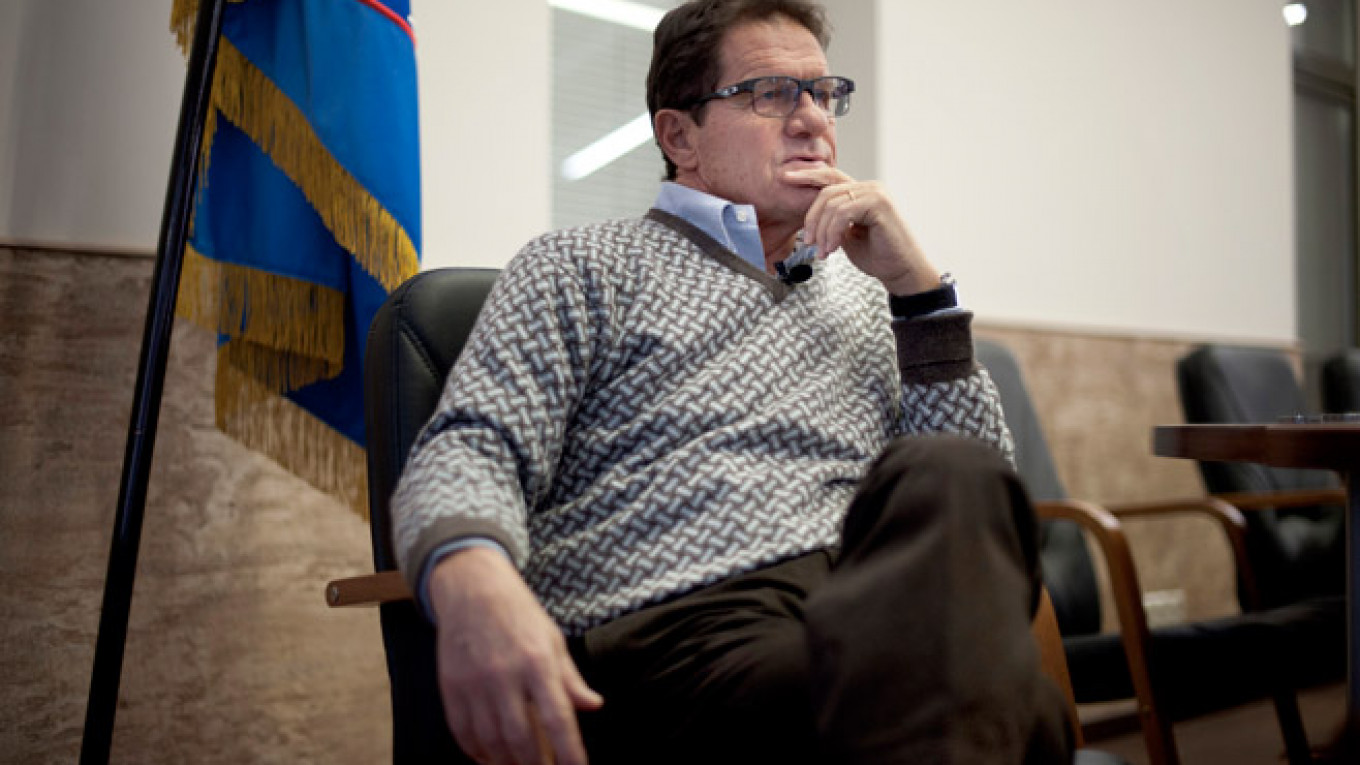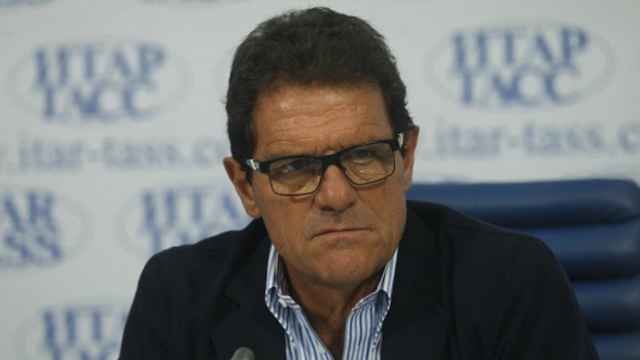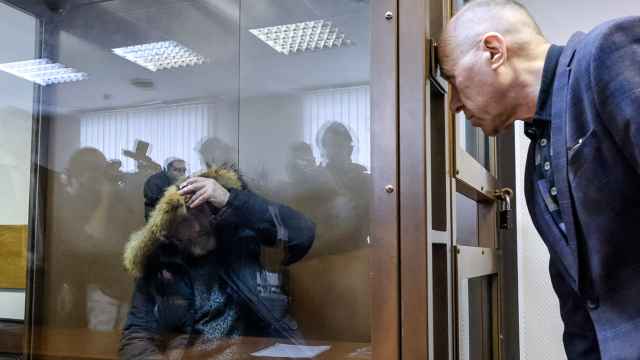The ruble may be falling hard and fast, but Fabio Capello wouldn't mind catching a few.
The head coach of the Russian national football team has not received a single kopek since his squad crashed out of the World Cup this summer without winning a match.
"I was at the offices of the football union this morning, [where] we were speaking about different questions," Capello said Monday during an interview with The Moscow Times, his grin suggesting that one of those issues may well have been the payment of six months' worth of backpay he is owed.
Capello may not have a Russian passport, but he is undoubtedly Team Russia's biggest star. The 68-year-old Italian, whose dark-rimmed glasses lend him an owlish glare, is more recognizable than his players. Fans approach him on the streets of Moscow or when he strolls through Gorky Park with his wife of 45 years. His avuncular demeanor, frank manner of speaking and role in Russia qualifying for this year's World Cup endeared him to the Russian public.
The deterioration of Russia's relations with the West over the crisis in Ukraine coincided with Russia falling out of love with its imported Italian coach. The man behind Russia's first World Cup appearance in 12 years suddenly became too costly — and too foreign — and Capello is now blamed for every mishap to befall the national team.
Unpaid Dues
Capello — who has been nicknamed the "iron sergeant" for his rigorous training style — was reportedly the highest paid coach at this year's World Cup in Brazil, earning an annual $11,235,210, according to Forbes.
After Russia officially qualified for the tournament in October 2013, Capello, who had joined the squad in 2012, was rewarded with a contract extension until the end of the 2018 World Cup, which Russia is set to host in 11 cities.
Yet recently there have been signs that the Russian Football Union (RFU) has come to regret its haste in committing to Capello. The head of the RFU, Nikolai Tolstykh, recently admitted that it did not have the funds to remunerate the coach. Capello is unlikely to be paid before the union's executive committee meeting on Dec. 16, where his salary will no doubt be high on the agenda.
Observers have speculated that the RFU's poor treatment of Capello is an attempt to push him to resign, which would save the union the hefty financial penalty it would have to pay to fire him. Capello's resignation would also camouflage Russia's mismanagement of the star coach and reinforce the idea that the head coach — not his players — was the root of the team's debacle in Brazil.
When asked whether he views the six-month delay in being paid as a palace coup, Capello shrugs.
"You have to ask the people who run the union and football in the country," he said. "It's not a question for me. Russia will organize the 2018 World Cup, and it is not paying its manager. This is not good for Russia's image around the world."
Russian authorities, who are well aware that under the country's legislation it is illegal not to pay employees for more than two months, have been only marginally apologetic.
In September, the RFU apologized to Capello and said it was making "all possible efforts" to pay him. Some Russian lawmakers have gone as far as to suggest that the coach's salary should be results-oriented and reflect the team's performance. After the team's subpar showing at the World Cup, Capello was called a "thief" by controversial right-wing politician Vladimir Zhirinovsky and urged to return most of his salary and resign.
Last month, Russian media outlets buzzed with rumors that Capello would be fired following a friendly against Hungary. But luckily for the head coach, Team Russia squeezed past Hungary with a 2-1 win, its first in four matches. Capello emerged unscathed, but remains unpaid.
Sports Minister Vitaly Mutko — who has denied that Russia will give up on its coach — said last month that he expects Capello to be paid by the end of the year, but that the government would not bail out the RFU. State news agency TASS reported in September that the RFU owed money to 22 other national team staff members, in addition to Capello.
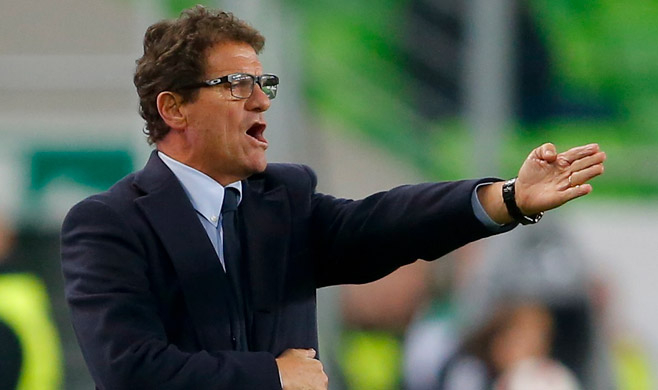
The 68-year-old head coach, nicknamed the "iron sergeant," reacting during a match in Budapest last month.
Unrealistic Expectations
Months after he resigned from the English national team over a dispute with the British Football Association in 2012, Capello signed a two-year contract to head 13th-ranked Team Russia. Football fans thought Capello's four-year stint with England would be his last position as head coach of a national team. But the energetic sexagenarian, whose athletic gait belies his age, was attracted by Russia's generous offer.
Russia's underperformance on the international football stage long predates Capello's leadership. The team was eliminated in the first round in its last three World Cup appearances, including this summer in Brazil. It also failed to qualify for the 2006 and 2010 World Cups.
Before Capello, Team Russia had gone through two Dutch coaches, Guus Hiddink and Dick Advocaat. The team's greatest accomplishment in the pre-Capello era was reaching the semifinals of Euro 2008, under Hiddink's leadership. But since placing ninth in FIFA world rankings in November 2012, Russia has dipped to its current rank of 30th.
Fabulous Fabio
In 2012, Capello's hiring was presented as a breath of fresh air. He was neither Russian nor Dutch and his top-notch resume was filled with tenures at AC Milan, Real Madrid, Roma and Juventus.
Last year, Capello led Russia to finish first in its World Cup qualifying group, ahead of Portugal. The head coach was hailed as a national hero for securing the team's presence at football's most prestigious tournament in Brazil.
"It was a really important moment for us," Capello said.
In the run-up to the World Cup, coach Capello starred in Coca-Cola commercials, in which he was shown working on his lineup using plastic bottles featuring players' first names as he sipped from his own "Fabio" bottle. Russian football fans were now on a first-name basis with the coach.
The expectations of the public and the government were high — and, at times, unrealistic — for Russia's first World Cup appearance in more than a decade. Blinded by patriotic optimism, 18 percent of Russians predicted that their national team would win the tournament, according to a survey conducted by a state-run pollster VTsIOM in June.
Capello told The Moscow Times that his inexperienced team crumbled under the weight of expectation at the World Cup. "The pressure was really high," he said. "After we qualified, people expected that we would get through the first round."
Fabio the Fall Guy
The head coach recognizes that his squad simply did not deliver. Its attack was repeatedly neutralized, scoring one goal every 19.5 attempts, while other World Cup teams on average scored after 9.1 attempts. In two uninspired draws and one loss, Russia scored one goal every 135 minutes, compared with the tournament average of a goal every 64 minutes.
The defense — in theory, the team's strongest asset — also faltered. Goalkeeper Igor Akinfeyev fumbled the ball on a harmless shot during the team's opening 1-1 against South Korea. After a public apology to the country, Akinfeyev was absolved of guilt for the blunder.
While the players received only mild criticism for their tepid performance, most of the blame was directed at Capello, whose past feats were quickly forgotten.
"The fans weren't happy [with our performance at the World Cup]," Capello said. "I wasn't either."
Capello, who had a prolific 15-year career as a midfielder in the Italian league and earned 32 caps with his country's national team, only managed high-performance club teams before coaching national sides. In the early 1990s, he led AC Milan to four championships in five seasons as well as to the 1994 European Cup. He went on to coach Spain's Real Madrid to two league titles and earned another Italian championship title with Roma in 2000.
As Russia now realizes, Capello's brilliant track record at the club stage has not transposed to his coaching of national teams. As head coach of England, Capello led the team to 15 wins in 22 competitive matches. But his squad was manhandled by Germany in the round of 16, losing 4-1 to the tournament's third-place finisher.
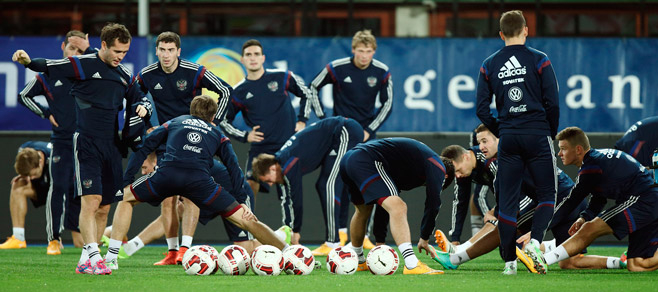
Capello's squad, Russia's national team, training in Vienna last month. The Italian coach says patience is the key to developing Russian football.
Format Clash
Sporadic international matches do not tie in well with Capello's traditional vision of success, which is intrinsically tied to daily toil and incremental progress.
"When you manage a club team, you work everyday to understand your mistakes and to improve," Capello said. "With the national team, it's different. You can play one or two games in one month, then have to wait two or three months for the next game. It's difficult to teach [players] how to improve. It's really difficult for the manager."
It was Sports Minister Mutko, not the RFU, who invited Capello to coach the team, according to Yevgeny Lovchev, a former Soviet defender who ran for president of the RFU in 2012. Sporting officials, he said, were blinded by Capello's credentials.
"Capello had already proven that he was a capable coach," Lovchev told The Moscow Times. "But a track record is not enough to select a trainer. There are other factors that need to be considered, including how suited to the team his style is. Many things were overlooked when he was hired."
Lovchev, who admitted he had advocated for Capello to be fired after the World Cup, has since softened his stance.
"Capello is aware that his team can do better," he said. "I can tell that he is doing the best he can with the players he has. He's not all about the money."
The RFU's plan for the sport's development through 2020 calls for "serious investment in human capital," including coaches, referees and other football specialists. It also notes that the sport's development in Russia is hindered by a lack of professional coaching staff, decent pitches and other training infrastructure, making it nearly impossible for professional clubs and training centers to compete with some of their European counterparts.
Scouting for Talent
Russia's current national team players are also homebodies. Even the squad's most marketable players such as Akinfeyev choose to stay home, failing to reap the benefit of superior competition in stronger European leagues.
"No coach — whether Capello or anybody else — can turn this squad into a championship-winning team," Lovchev said. "For that you would need 10 Akinfeyevs and 10 [Zenit St. Petersburg striker Andrei] Arshavins."
Capello, who selects Russia's national team players, says patience is the key to developing Russian football.
"I think you need to wait," Capello said. "Look at Belgium. They were a really good team 30 or 35 years ago, I remember. After that, nothing. And suddenly, they have become good again because they found five or six good players. I hope — for me and for Russia — that we will also find new good players."
Russia is still struggling to qualify for Euro 2016. The country is currently third in its group, behind Austria and Sweden. After a disappointing 1-1 draw to Moldova in a qualifying match in October, Mutko said he was not pleased with the team's performance and that he would have a little "chat" with Capello.
Capello escapes from the recriminations and salary disputes through art. An avid art collector, the coach talks enthusiastically about his recent visit to London's Saatchi Gallery and about Russia's greatest 20th-century artists — Marc Chagall, Wassily Kandinsky — and marvels at the majestic beauty of the golden cupolas and gilded interiors of Russian Orthodox churches.
As host nation of the tournament, Russia automatically qualifies for the 2018 World Cup, which is already marred by controversy. The Sunday Times recently reported that Russia had allegedly given Michel Platini, UEFA president and a FIFA executive member, a Pablo Picasso painting in exchange for supporting the country's World Cup bid.
Would Capello accept a work of art as compensation for six months of unpaid work?
"If I get to choose which one, then yes, why not," he says, laughing.
Contact the author at [email protected]
A Message from The Moscow Times:
Dear readers,
We are facing unprecedented challenges. Russia's Prosecutor General's Office has designated The Moscow Times as an "undesirable" organization, criminalizing our work and putting our staff at risk of prosecution. This follows our earlier unjust labeling as a "foreign agent."
These actions are direct attempts to silence independent journalism in Russia. The authorities claim our work "discredits the decisions of the Russian leadership." We see things differently: we strive to provide accurate, unbiased reporting on Russia.
We, the journalists of The Moscow Times, refuse to be silenced. But to continue our work, we need your help.
Your support, no matter how small, makes a world of difference. If you can, please support us monthly starting from just $2. It's quick to set up, and every contribution makes a significant impact.
By supporting The Moscow Times, you're defending open, independent journalism in the face of repression. Thank you for standing with us.
Remind me later.


